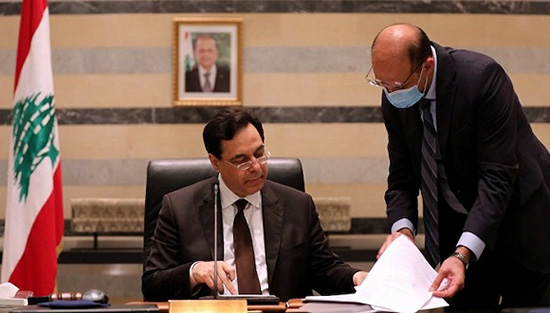Abstract: It has not been a week since the explosion in the Beirut port of Lebanon, but many big things have happened in Lebanon. First, the explosion triggered a large-scale protest march, and then Lebanese Prime Minister Diab and his cabinet announced their resignation on Monday (August 10). The cabinet was established less than eight months ago. Diab had previously called for early parliamentary elections. , In order to solve the various crises currently facing Lebanon.
It has not been a week since the explosion in the Beirut port of Lebanon, but many big things have happened in Lebanon. First, the explosion triggered a large-scale protest march, and then Lebanese Prime Minister Diab and his cabinet announced their resignation on Monday (August 10). The cabinet was established less than eight months ago. Diab had previously called for early parliamentary elections. , In order to solve the various crises currently facing Lebanon.
Diab said the explosion was the result of corruption in Lebanon
A few days ago, Diab said in a television speech, “I started to fight corruption, but found that corruption is bigger than the country. Today I announce the resignation of this government. May God bless Lebanon.”
Diab said in his speech that he is taking a step back so that he can stand with the people and "fight for change side by side with the people." He said that the Beirut bombing was the result of local corruption in the country. "We join the people in calling for trials of those who are guilty."
He added: "They (political class) should be ashamed of themselves because their corruption has led to this disaster that has been hidden for seven years."

Prior to this, four ministers, including the Minister of Justice, the Minister of Information, the Minister of Environment, and the Minister of Finance, had announced their resignations after the explosion. The country’s foreign minister resigned before the explosion because he was disappointed by the lack of government reforms.
Analysts believe that the resignation of the cabinet will not only fail to resolve the political and economic crisis facing Lebanon, it may bring greater political instability. Lebanon is one of the most important cultural and financial centers in the Middle East, and it is also more stable than its war-torn neighbor Syria.
Imad Salamey, a political scientist at the American University of Beirut in Lebanon, pointed out that Lebanon is now not only facing a lack of government and a political vacuum, but also serious problems with the functioning of government functions. "We are heading towards the unknown," he said.
Thousands of people march in Beirut, demanding that the government resign and implement reforms
This past weekend, thousands of people in Beirut held demonstrations, demanding that the government resign and implement reforms. The demonstration quickly turned into a large-scale conflict between protesters and law enforcement officials. Protesters occupied the office buildings of four ministries and bank associations. The Lebanese Ministry of Interior claimed that a law enforcement officer was dead. According to previous news, more than 700 people were injured in the conflict.
On the evening of August 4, a violent explosion occurred in the port area of Beirut, the capital, killing at least 160 people and injuring more than 6,000. Dozens of others were unaccounted for and 300,000 people were left homeless. Preliminary investigations indicated that the explosion was caused by a fire, which subsequently ignited 2,750 tons of ammonium nitrate stored in another warehouse.

Customs officials claimed that they had repeatedly reminded the authorities of ammonium nitrate stored in the port for many years, but received no response. Since the explosion, the Lebanese authorities have arrested 20 people, mostly port officials. But the protesters demanded that the top government officials continue to be held accountable.
This also reflects the opposition of the people of the country to the political elite. Many political leaders were former warlords during the civil war in the 1980s. Many Lebanese believe that the entire political class is responsible for decades of corruption and negligence, and last week’s bombing was an extreme manifestation of government incompetence. More and more protesters are calling for a thorough reform of the political system, not just a change of government.
Now Lebanon is facing the task of finding a third prime minister in less than a year.
